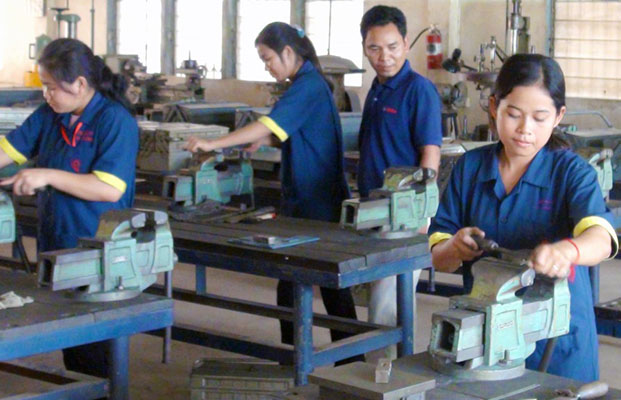
Tearing Down Barriers to Educational Inclusion
“To educate a woman is always a great investment; it is to guarantee a good future for our nation.” So said H.E. Ken Satha, governor of the Kep province in southern Cambodia, during a 2012 dedication ceremony for a girls’ dormitory at the Don Bosco Technical School. Today, Father Albeiro Rodas Samnang continues to advocate for equal educational access through his visionary leadership of the institution — changing attitudes, and lives, in the process.
The moment Don Bosco Kep first opened its doors in 2011, Fr. Albeiro committed to creating pathways toward inclusion for the area’s most disadvantaged children and youth. Catering especially to girls and boys from the rural, impoverished communities of Takeo, Kampot and Kep, the school quickly distinguished itself as an early innovator in accommodating students living with disabilities.
“Disabled children and youth are among the most marginalized members of society,” says Fr. Albeiro. “They are often confined to their homes, unable to attend school, and are actively excluded from the workforce.” As a result, they face chronic unemployment, endemic poverty, poor health and low self-esteem. And the consequences are even worse for disabled girls who — studies have shown — often suffer discrimination within their own families, receive inadequate early childhood care, and find it much more difficult to access rehabilitation services, education and job opportunities.
“For this reason, the positive impacts [of campus accessibility] are disproportionally felt by female students who otherwise would be unlikely to go to school, and ultimately achieve self-sufficiency,” explains Fr. Albeiro. “We are actively helping these particularly at-risk students achieve their full potential, and graduate with the skills they need to support themselves and live independently.”
As of the 2017 school year, among Don Bosco Kep’s 250 students, 98 were disabled. Of these, 74 graduated with a professional certificate that qualifies them for careers in communication and journalism; tailoring; information technology; hospitality; and other in-demand jobs. By ensuring that all students have opportunities to lead fulfilling lives, and contribute to the social, cultural and economic vitality of their communities and country, the school serves as a model for other institutions across Cambodia.
Which brings us back to Governor Satha’s quote. In Cambodia today, girls — both disabled and non-disabled alike — continue to grapple with the unique challenges of gender disparity, especially in education and employment. Although a traditionally matriarchal society, as noted by Fr. Albeiro, prevailing cultural attitudes maintain that girls and women belong in the home, tending children and fulfilling domestic duties. As such, many parents don’t see the need to send their daughters to school; an attitude that’s especially true among rural families who desperately need opportunities to break the cycle of poverty and despair.
In partnership with Don Bosco Kep Children’s Fund, Fr. Albeiro and his staff fully support girls’ efforts to study. Girls’ dormitories staffed by female teachers and Salesian sisters help prevent them from leaving school and becoming targets of labor exploitation, trafficking and other abuses. “Of course, we do the same for boys,” he says. “Diversity, gender equality, and education for all is written into our mission statement.”
Explaining that all of the school’s technical sections are open to both genders, including those traditionally associated with one or the other, Fr. Albeiro says that “here, female students believe they can aspire to anything if they have the same opportunities as their male peers.” In fact, “when I opened the electrical department in 2012,” he continues, “male teachers thought it was an odd idea. One assumption was that girls were unable to climb ladders. I showed them photos of female electricians in other countries.”
That first year, five girls applied to the program and worked hard to be taken seriously. “They proved to be better at mathematics than the boys,” says Fr. Albeiro. “They were among the best students!”
Yet, on the cusp of graduation, these girls faced another monumental barrier.
“After overcoming poverty, marginalization and sometimes disabilities, their next challenge was to get a job,” Fr. Albeiro explains. “When the supervisor of a local company came to us for employee recommendations, we gave him all the students’ files; he went through them and removed all of the girls!”
Undeterred, Fr. Albeiro personally contacted the employer to advocate on behalf of his female students. Convinced by Fr. Albeiro assurances that they were just as qualified as the males, the employer called one of the girls for an interview, and she got the job. In this way, Don Bosco Kep is breaking down the barriers to education and employment, one student at a time.
Our mission helps girls and young women overcome adversity, and build brighter futures, through educational opportunities. What’s your mission?

